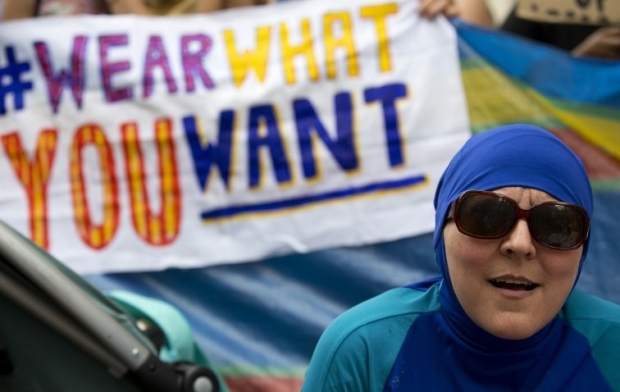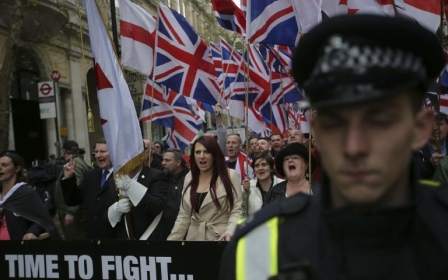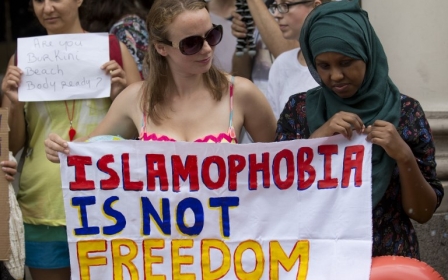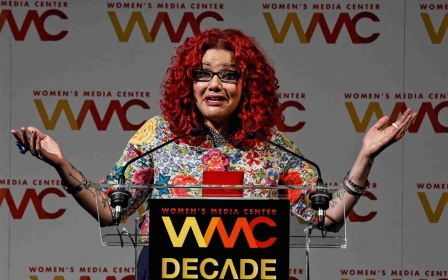Boris Johnson's burqa comments put British Muslim women in danger
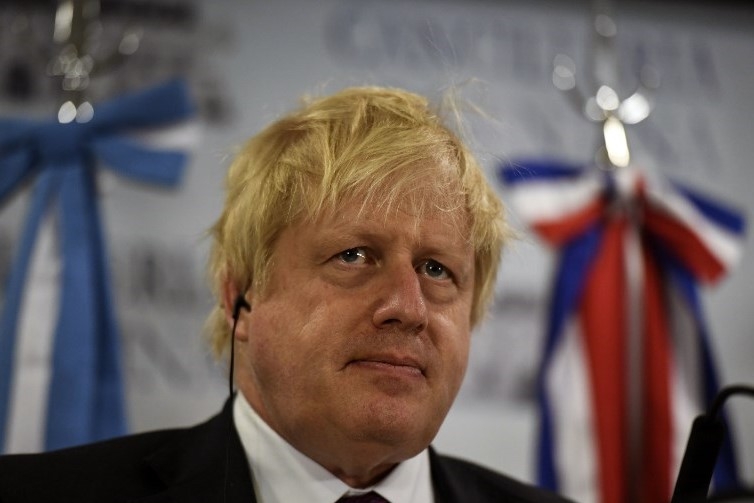
Boris Johnson's recent comments comparing Muslim women who wear the face veil to "letterboxes" are not only reprehensible, but prove the validity of Sayeeda Warsi’s 2011 warning that Islamophobia has "passed the dinner table test".
That he was once the mayor of multicultural, diverse London and, until last month, our country’s foreign secretary is worrying, proving that Islamophobia remains part of the political mainstream in the UK. Indeed, at this moment, Johnson's comments tell us that British Islamaphobes feel emboldened and that Islamaphobia is entrenched in a powerful section of the establishment.
The Conservative Party has been accused of turning a blind eye to Islamophobia within its own ranks. After a litany of Islamophobic comments and tweets from representatives of the party, the Muslim Council of Britain called for an inquiry. Yet while party chairman Brandon Lewis vowed the right-wing party would "stamp out" Islamophobia, he did not announce an inquiry.
Political fodder
Muslim women being used as political fodder is not new. We may recall former Prime Minister David Cameron, another Conservative, suggesting that one of the main reasons young Muslim men are vulnerable to radicalisation is that their mothers are "traditionally submissive". When the British establishment engages with Muslims, that engagement is often to do with security concerns, as if we were not equal citizens in our own right but merely powder kegs ready to explode.
Many political leaders and members of the British political elite are totally detached from the lives of ordinary citizens. They may describe Johnson’s comments as “unfortunate”, but out here in the real world, the consequences for many British Muslim women are serious.
In 2017, the monitoring group Tell Mama recorded the highest number of anti-Muslim incidents since the organisation began recording hate crimes, with six in 10 Islamophobia victims being Muslim women. More than half were "visibly Muslim" because they wore a head scarf or face veil.
This type of Islamophobia contributes to society becoming increasingly detached from the anxiety and insecurity many Muslim women feel on a daily basis
Johnson’s comments are far from being a debate about “liberal values”; they actively and openly contribute to creating an environment in which the far right can thrive, and where racists and Islamophobes are emboldened to attack Muslim women. The Conservative politician has been in regular contact with far-right ideologue Steve Bannon, the man behind Donald Trump's 2016 election victory, and a desire to push a more extreme agenda can be seen at work.
When we founded the Muslim Women’s Collective in early 2017, women told us about having their face veils pulled off while shopping with their children, or having abuse hurled at them as they waited to see a doctor. In one case, a woman was deliberately hit by a car as she returned home from dropping her children at school.
Dehumanising Muslim women
When politicians consciously mock Muslim women in the way that Johnson has, they dehumanise us. This type of Islamophobia contributes to society becoming increasingly detached from the anxiety and insecurity many Muslim women feel on a daily basis.
There are very few visibly Muslim women who have not been verbally or physically assaulted at some point, simply because of who we are and how we choose to manifest our faith in a liberal and plural society. Muslim women who wear the face veil are at the forefront of a much more pervasive issue: the fact that anti-Muslim hate crime affects hundreds of thousands of Muslim women, and their families, in this country.
To argue this is to undermine the experiences of Muslim women who have been abused and attacked by “ordinary” people.
This unwillingness to accept Islamophobia as a growing and distinct form of discrimination is compounded by the abject failure of successive governments to adequately define or challenge Islamophobia. While much of the recent debate has been focused on the Conservative Party, the issue goes much further than that.
Islamophobia is deeply embedded into our society and transcends political divisions - yet in the political sphere, it continues to be "simplistically defined, vaguely conceived and routinely contested". Attempts to tackle the issue have failed, as numerous parliamentary groups have achieved little towards an agreement on what constitutes Islamophobia, let alone a strategy to counter it.
Challenging racism
Meanwhile, the growing body of evidence from organisations such as Tell MAMA, which highlights the scale of the problem, is collecting dust. We do not simply need an inquiry into Islamophobia in the Conservative Party. We need a debate on how it has seeped into the political mainstream, and how policymakers and media representatives contribute to creating an environment in which Islamophobic bigots thrive.
Although Johnson has faced condemnation - including the prime minister, Theresa May, calling on him to apologise - the fundamental problem remains. As British Muslim women, we need Islamophobia to be taken seriously at a political policy level - for it to be challenged as a form of racism, and for British Muslim women to play a leading role in this process.
We need an acknowledgment of the fact that, while this country has a longstanding history of racism and anti-Muslim sentiment, Islamophobia is becoming increasingly normalised in political discourse. Johnson’s comments may have targeted women wearing the face veil, a relatively small subsection, but the Islamophobia behind his statements - and those of numerous other politicians - affects every single Muslim in the UK.
It is about time we acknowledge this and start addressing all forms of bigotry and racism in this country, regardless of the target.
- Sulekha Hassan is a member and co-founder of the Muslim Women's Collective- a social media forum for British muslim women. She tweets @sulekhaYH
-Bushra Wasty is a member and co-founder of the Muslim Women's Collective. She tweets @bushrawastea.
-Jennifer Philippa Eggert is a member of the Muslim Women's Collective. She tweets @j_p_eggert.
The views expressed in this article belong to the author and do not necessarily reflect the editorial policy of Middle East Eye.
Photo: Then British Secretary of State for Foreign Affairs Boris Johnson during a press conference on 22 May, 2018 (AFP)
Middle East Eye propose une couverture et une analyse indépendantes et incomparables du Moyen-Orient, de l’Afrique du Nord et d’autres régions du monde. Pour en savoir plus sur la reprise de ce contenu et les frais qui s’appliquent, veuillez remplir ce formulaire [en anglais]. Pour en savoir plus sur MEE, cliquez ici [en anglais].


